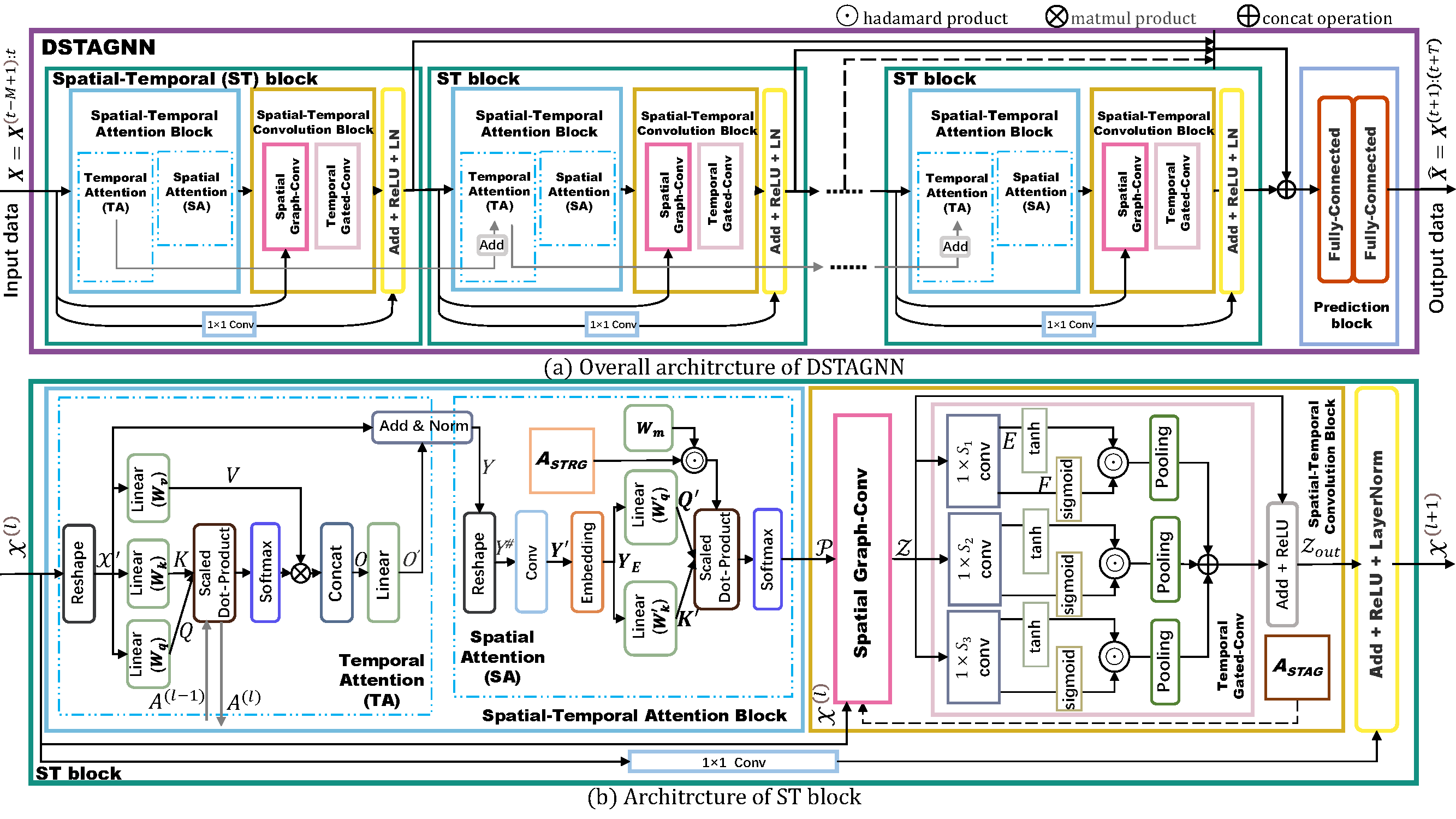DSTAGNN: Dynamic Spatial-Temporal Aware Graph Neural Network for Traffic Flow Forecasting
DSTAGNN: Dynamic Spatial-Temporal Aware Graph Neural Network for Traffic Flow Forecasting, Proceedings of the 39th International Conference on Machine Learning, PMLR 162:11906-11917. (ICML 2022)
Paper is availabe at https://proceedings.mlr.press/v162/lan22a/lan22a.pdf
- python >= 3.5
- scipy
- tensorboard
- pytorch
Step 1: DSTAGNN is implemented on those several public traffic datasets.
- PEMS03, PEMS04, PEMS07 and PEMS08 from STSGCN (AAAI-20).
Download the data STSGCN_data.tar.gz with password:
p72zand uncompress data file usingtar -zxvf data.tar.gz
Step 2: Process dataset
-
on PEMS03 dataset
python prepareData.py --config configurations/PEMS03_dstagnn.conf
-
on PEMS04 dataset
python prepareData.py --config configurations/PEMS04_dstagnn.conf
-
on PEMS07 dataset
python prepareData.py --config configurations/PEMS07_dstagnn.conf
-
on PEMS08 dataset
python prepareData.py --config configurations/PEMS08_dstagnn.conf
If traffic data is available, its aware grap could also be generated by code:
cd ./data/
python STAG_gen.py
The shape of input traffic data should be "(Total_Time_Steps, Node_Number). For example, in PEMS08 dataset, it has 170 roads and 62 days data. Thus its shape is (62*288, 170).
The calculation uses CPU, which should be prepared for enough computation resources.
-
on PEMS03 dataset
python train_DSTAGNN.py --config configurations/PEMS03_dstagnn.conf
-
on PEMS04 dataset
python train_DSTAGNN.py --config configurations/PEMS04_dstagnn.conf
-
on PEMS07 dataset
python train_DSTAGNN.py --config configurations/PEMS07_dstagnn.conf
-
on PEMS08 dataset
python train_DSTAGNN.py --config configurations/PEMS08_dstagnn.conf
-
visualize training progress:
tensorboard --logdir logs --port 6006then open http://127.0.0.1:6006 to visualize the training process.
The configuration file config.conf contains two parts: Data, Training:
- adj_filename: path of the adjacency matrix file
- graph_signal_matrix_filename: path of graph signal matrix file
- stag_filename:path of the Spatial-Temporal Aware Grap file
- strg_filename:path of the Spatial-Temporal Relevance Graph file
- num_of_vertices: number of vertices
- points_per_hour: points per hour, in our dataset is 12
- num_for_predict: points to predict, in our model is 12
- graph: select the graph structure, G or AG, G stands for adjacency graph, AG stands for Spatial-Temporal Aware Grap
- ctx: set ctx = cpu, or set gpu-0, which means the first gpu device
- epochs: int, epochs to train
- learning_rate: float, like 0.0001
- batch_size: int
- num_of_weeks: int, how many weeks' data will be used
- num_of_days: int, how many days' data will be used
- num_of_hours: int, how many hours' data will be used
- n_heads: int, number of temporal att heads will be used
- d_k: int, the dimensions of the Q, K, and V vectors will be used
- d_model: int, d_E
- K: int, K-order chebyshev polynomials (number of spatial att heads) will be used
